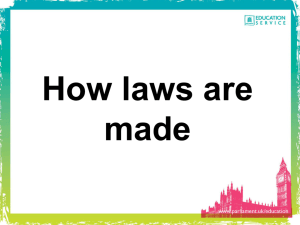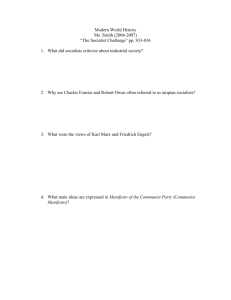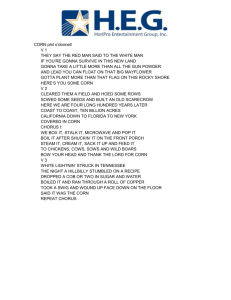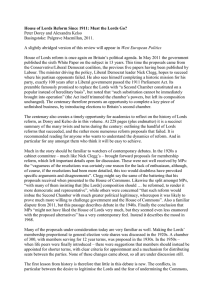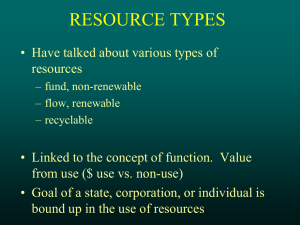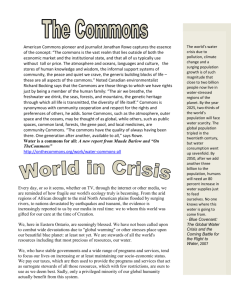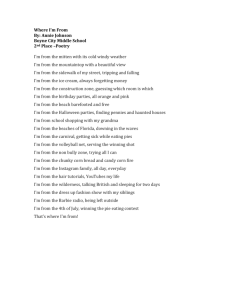Early 19th Century Culture
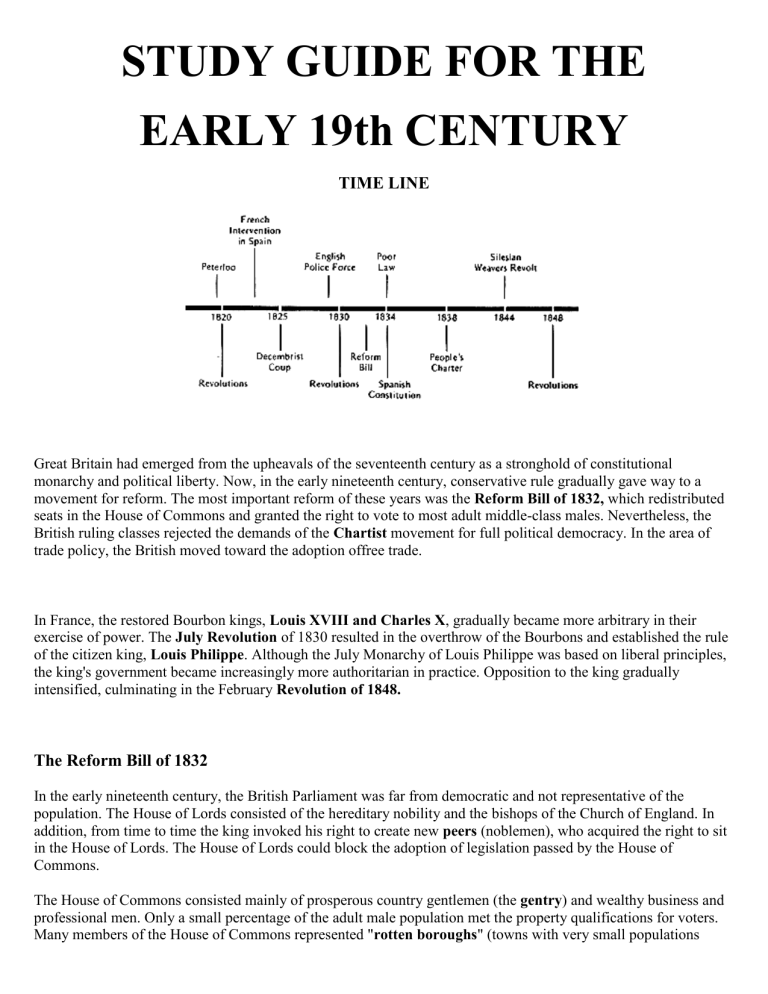
STUDY GUIDE FOR THE
EARLY 19th CENTURY
TIME LINE
Great Britain had emerged from the upheavals of the seventeenth century as a stronghold of constitutional monarchy and political liberty. Now, in the early nineteenth century, conservative rule gradually gave way to a movement for reform. The most important reform of these years was the Reform Bill of 1832, which redistributed seats in the House of Commons and granted the right to vote to most adult middle-class males. Nevertheless, the
British ruling classes rejected the demands of the Chartist movement for full political democracy. In the area of trade policy, the British moved toward the adoption offree trade.
In France, the restored Bourbon kings, Louis XVIII and Charles X , gradually became more arbitrary in their exercise of power. The July Revolution of 1830 resulted in the overthrow of the Bourbons and established the rule of the citizen king, Louis Philippe . Although the July Monarchy of Louis Philippe was based on liberal principles, the king's government became increasingly more authoritarian in practice. Opposition to the king gradually intensified, culminating in the February Revolution of 1848.
The Reform Bill of 1832
In the early nineteenth century, the British Parliament was far from democratic and not representative of the population. The House of Lords consisted of the hereditary nobility and the bishops of the Church of England. In addition, from time to time the king invoked his right to create new peers (noblemen), who acquired the right to sit in the House of Lords. The House of Lords could block the adoption of legislation passed by the House of
Commons.
The House of Commons consisted mainly of prosperous country gentlemen (the gentry ) and wealthy business and professional men. Only a small percentage of the adult male population met the property qualifications for voters.
Many members of the House of Commons represented " rotten boroughs " (towns with very small populations
whose voters could readily be bribed or otherwise influenced) or " pocket boroughs " (towns whose representatives in the House of Commons were selected by noble landowners). The new industrial towns were either completely without representation or seriously underrepresented.
The Corn Laws
The campaign for the repeal of the Corn Laws provided powerful evidence of the increased political power of the
British middle class. The Anti-Corn Law League, which was established in 1839, campaigned for the repeal of the
Corn Laws (the tariff on wheat and other grains) and more broadly, for the introduction of free trade. The Corn
Laws, which had been adopted in 1815, provided the great landowners with a protected market for their crops. The leaders of the Anti-Corn Law League included the prominent industrialists Richard Cobden (1804-1865) and John
Bright (1811-1889).
The Anti-Corn Law League argued that reducing the price of food would improve the workers' standard of living, while reducing the cost of raw materials would increase the profits of industry. In addition, low food prices would make it easier for the industrialists to pay their workers lower wages.
THE ISMS OF THE 19TH CENTURY
ROMANTICISM
Rousseau was founder and father of the movement. Romantic thinkers refused to conceive of human nature as primarily rational. They wanted to interpret physical nature and human society inorganic rather than mechanical terms. The most basic viewpoint was the rejection of reason and a new reliance upon emotion and imagination as sources of understanding. Romantic painters like to use historical events as subjects. Romantics liked: religion; medieval art, literature, architecture; and were interested in folklore, folk songs,fairy tales, and dreams. They suggested the existence of a world beyond the normal sensory data. The movement most prospered in Germany.
NATIONALISM
Nationalism is a state of mind, in which the supreme loyalty of the individual is felt to be due the nation-state. It is deep attachment to one's native soil, to local traditions and to established territorial authority. Nationalities are the products of the living forces of history, and therefore fluctuating and never rigid. Most often they possess certain objective factors distinguishing them from other national groups such as: common descent, language, territory, political entity, customs, traditions, and religion.
UTILITARIANISM
They were a set of radical political reformers who urged the principal of utility-the greatest good for the greatest number --should constitute the guiding principal of public policy. They lacked all reverence for tradition. They felt that political, economic, social problems should be addressed rationally and without reference to special interests groups. They have frequently been claimed as the spokesmen for the middle class.They were the authors of much legislation such as: F actory Act of 1833, Poor Law of 1834, and the Sanitation Act of 1848. John Stuart Mill
most ardent spokesman and urged education of the workers as the means to raise their standard of living. Other noted utilitarians were Jeremy Bentham , and Sir Edward Chadwick.
SOCIALISM
Early socialists generally applauded the new productive capacity of industrialism, but they deny that a free market could adequately produce and distribute goods in the fashion claimed by classical economists. They saw primarily mismanagement, low wages, maldistribution of goods, and suffering arising from unregulated industrial system.
They felt that human society should be organized as a community rather than as selfish individuals.
UTOPIAN SOCIALISTS
Were considered utopian because their ideas were often visionary and because they advocated the creation of ideal communities. They were called socialists because they questioned the structures of capitalism. In What is Property,
Joseph Proudhon (1819-1877) attacked the banking system which would not loan money to the small property owners or the poor. Other Utilitarians included Claude Henri ( Count of Saint-Simon 1760-1825), Robert Owen
(1771-1858), and Charles Fourier (1772-1837).
